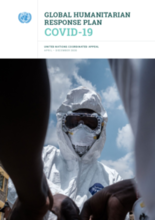The COVID-19 Global HRP is a joint effort by members of the Inter-Agency Standing Committee (IASC), including UN, other international organizations and NGOs with a humanitarian mandate, to analyse and respond to the direct public health and indirect immediate humanitarian consequences of the pandemic, particularly on people in countries already facing other crises.
It aggregates relevant COVID-19 appeals and inputs from WFP, WHO, IOM, UNDP, UNFPA, UN-Habitat, UNHCR, UNICEF and NGOs, and it complements other plans developed by the International Red Cross and Red Crescent Movement.
NGOs and NGO consortiums have been instrumental in helping shape the plan and conveying local actors’ perspectives, and they will play a direct role in service delivery. NGOs will be able to access funding mobilized in the framework of this plan and related country plans through partner arrangements with UN agencies, through pooled funding mechanisms, including Country-Based Pooled Funds, and through direct donor funding.
This ensures complementarity, synergy, gaps and needs identification, and a coordinated response. The Global HRP also complements and supports existing government responses and national coordination mechanisms, with due consideration paid to the respect for humanitarian principles.
The Global HRP identifies the most affected and vulnerable population groups in priority countries, including countries with an ongoing Humanitarian Response Plan, Refugee Response Plan or multi-country/subregional response plan, as well as countries that have requested international assistance, such as Iran. Updates to existing country plans should be initiated to ensure that humanitarian organizations are prepared and able to meet the additional humanitarian needs occasioned by the pandemic. Further updates to these plans will likely be necessary if a major outbreak occurs. In other countries, a humanitarian response plan/Flash Appeal should be considered if they are unable to cope with the emergency.
Regarding the effects on protection and rights of children, the document notes that "school closures may increase protection risks for children, in particular in many of the refugee and IDP-hosting countries or areas. Children outside of family care, such as street children, children on the move, and children in institutions or in detention centres, are particularly vulnerable, including to discrimination within the community. Measures taken in response to COVID-19 and their impact on family unity and coping mechanisms, may cause children to be at heightened risk of being separated or unsupervised for longer periods, suffer neglect and increase their risk of being abused or exploited, including girls who can fall victim of sexual and gender-based violence."
The document continues that "it is currently unclear whether social distancing will affect participation in community-based initiatives or how isolation and other COVID-19 measures may impact family separation and neglect of children or other people with specific needs, such as people with disabilities or older people."
Among the list of most affected and at-risk population groups, the plan highlights "children losing or being separated from primary caregivers due to quarantine or confinement measures are at increased risk of neglect, abandonment, violence and exploitation. They may also lack access to health treatment, and suffer mental health and psychosocial impacts, and malnutrition. While children are so far not at particular risk of COVID-19 complications, many are affecting by wasting and have a higher risk of morbidity and mortality."
Among the responses outlined in the document, the plan calls for "protection and social, psychosocial, legal and justice services for all, including asylum seekers, refugees, IDPs, stranded migrants and other particularly vulnerable groups (e.g., survivors of gender-based violence, adolescent girls, unaccompanied/ separated children, etc.) at risk of discrimination and exclusion."
Access the abridged plan in several languages here.

